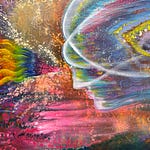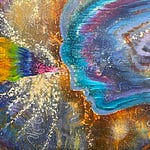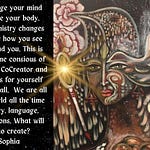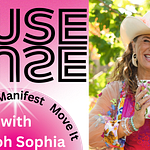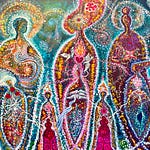Here is the audio transcript if you wish to read with a cuppa instead ❤️
Dear Ones,
I wonder if you find yourself thinking about the different worlds that we seem to inhabit as a self, but largely unconsciously. It's almost like we become aware of worlds as we become adults because we've lost some connection to it somewhere between childhood and adulthood. We stopped seeing and dreaming in the way that we used to when we used to have imaginary friends and imaginary worlds.
I can't help but wonder if we wouldn't have a different world at large if children were truly taught to keep their imaginal world front and center as a way of thinking and being. We're not very old, eight to 12 depending on the culture that we're living in, sometimes even younger than that, before we start to create a disconnect, whether that's conscious by adults in our space, I think largely unconscious, or just in a desire to sit into being inside of a structure.
If we don't act like we're present and participating in culture, we sometimes are told we're daydreamers. We're told to stop making things up and stop pretending. We're told to grow up and use our adult voice. We're taught not to use our outside voice inside. But while all this is happening and has a relative level of logic to it, something else is being lost. We don't even know enough about it to talk about it.
Many people have to become adults and be able to afford education in order to start thinking about the imaginal world they left behind as a child. So many people we work with in our intentional creativity community can remember the moment they put down a crayon. That's how significant that moment is. If I ask them what was happening in that day, or even what they wearing or who was there, they often have this almost supernatural vision of themselves in that moment.
We're yet to determine why that image is so absolutely looming and huge in our lives. Why that moment would be so big that we would actually stop creating, sometimes until we're adult. I have different theories about why I think that moment is so significant.
One of them is that, until that moment, we are largely connected with our imaginal world, and move freely and easily between imagination and what others around us perceive as a kind of reality. When someone becomes critical of our creativity, which in many cases is an externalized version of our internal world, whether that's drawing, singing, dancing, playing, make-believe, when that in any way gets criticized, when it had been largely encouraged before, but nobody told us when we were going to stop being encouraged to be imaginative. There was no warning. We get surprised.
In that moment, something happens, a rupture, that it could take the rest of someone's life to repair, if we even know to do it. It's almost like we're caught in the act of somehow not being connected, somehow not being connected to the reality that the adults around us have been enforcing. It's a moment, it's a flash, it's a rupture, and we start to, in a way for many of us, become concerned about ourselves.
It could be a moment where self-trust is lessened and where we recognize a stark reality between what we think of as our imagination and what we are now crashing into as the reality in which everyone else is living and somehow we weren't. My mother, Karen, used to think of this moment as a time when many people would start to think they were just a little bit crazy and had to hide and pretend to behave in order to fit in.
Over days, months, or years of trying to fit in and not invite that imaginary friend to the lunch table anymore, because now there's real friends to behave and act normal with, we actually start to lose trust with that internal world. And then later, as we go on in education, we're criticized if we're not connected to our creativity and our imagination. We're criticized if we're too structured, too A type, too left brain. And so this tug of war between imagination and reality is set in place and barely ever do we actually talk about it in a way that can be understood and healed.
In the work of intentional creativity, the invitation is to reconnect to the imaginal world while still being connected with the resonant world. I call it resonant world because I don't want it to be an external world from our internal world. External inherent in the vocabulary actually indicates separateness.
If we could move from our inner world to our imaginal world and then into a resonant world, we would be able to navigate what we experience as internal and imaginal, and relate it and bring it into harmony with the resonance of those people, places, things, animals, energies, archetypes, creatures, symbols, and stories all around us. We would have a sense of place in the cycle of things and a sense of our own place. It would be resonant and we would seek for contextual resonance by choice, and our imagination would give us contextual relevance.
One of the things I have to watch myself with when I'm leading circle is when someone seems out of context. In my family's world, context is queen. It means you are conscious of being appropriate to the context. And when someone isn't appropriate to the context, to me, it interferes with the resonance, and I want to smooth it over and stop it. That's my first response. What my mom would call a knee jerk response. It's the first response.
The second response is, how is this important right now? How is this wild moment leading to something else? If someone's breaking out into a dance in the middle of a meditation, should I invite everyone to dance? If someone's making a lot of loud noises or opening a candy wrapper while I'm trying to say a prayer, should I suddenly start to make sounds and invite everybody to do the same? Should I ask the person to stop or should I impatiently wait?
When I lead circle, it's this interesting moment to notice all the sharp bits about myself, about how much I desire a level of coherence. But a resonant world wouldn't necessarily be that everything is the same and in harmony. It would actually mean that everything works in tandem and it's time together, and that there is a place for everything.
What I think I'm really reacting to is what I perceive as a lack of consciousness or a lack of willingness to participate in what I consider the energy that I'm weaving or that's present. That's where the overworld comes in. Dr. Clarissa Pinkola Estes, who wrote, Women Who Run with the Wolves would say that this is an over culture, a dominant power over kind of energy that exists at the level of paradigm. Pretty much all of us participate in it, even those of us who lead circle.
For me, when I notice that overworld coming in or have a desire to control for the sake of myself and everyone in the room, because I think it's best for everyone, for there to be coherence, I have to just stop and ask myself, what is the wild one in the room trying to show us? In almost all indigenous cultures, there's a wild one.
There's an emu in the indigenous aboriginal culture. There's the coyote in Native American culture. The trickster exists in so many forms all around the world, and I admit it's one of the places I have trouble. We have quite a few tricksters in our community. You know who you are. And I sometimes am challenged by the context, but that's part of the role of the trickster to shake things up. And what if a resonant field is woven all together with the tricksters?
And what if those of us who are pretending toward consciousness could recognize the trickster as part of the resonance? The trickster, FYI, for your information, is usually one of the highest intelligent beings in the circle because they're actually paying attention to everything that's happening. And for there to be a true resonance, there has to be a true diversity, and tricksters act out when they see there's homogeny instead of resonance.
As I grow up, I'm learning. And I'm learning how trickster is not my own archetype, but how I value the supreme, hilarious intelligence of those around me. For example, on Sonoma Mountain, the land that we revere here in Sonoma County, which is considered the birthplace of creation for the coast Miwok, the creator of the world is coyote. I sigh when I hear that because I'm like, "Ugh, I do not want an engagement with coyote." But I do want an engagement with coyote's children, two sisters - question women and answer women, and they exist often as two crows cackling on a fence.
I think I've seen them. I think I've heard their stories. I think I've heard them laughing at me, with me, beside me, at all of this madness. So I watch my participation in the overworld. The dominant world is something else altogether. An overworld is the way that we try to fit in to structures and circles or insist that other people do. It's largely unconscious, and I'm not saying there's not a place for this overness, but overness unchecked becomes a form of supremacy, and at its worse, domination, and at its very, very worse, a kind of white supremacy which becomes paradigmatic in the consciousness of the individual.
I'm coming to you today with an invitation to begin to make some distinctions for yourself, within yourself, or the capital S itself. How do you think of your internal world or your internal self? Sometimes what I call the hidden self, because largely we're not conscious of the power it has and the way it operates, yet it's operating all the time. In fact, it operates how you speak to yourself, whether you hear the critic or the muse or some other cacophony. How do you be with your imaginal world? Have you been hanging out there recently? Have you done some healing?
If you create with us the giant paintings that we work on or engage with us in any of our courses, then you've reengaged with your imaginal world because it's absolutely essential to creating a painting and writing a story from the perspective of the painting. We do a lot of healing around the imaginal world in our community.
Where do you see yourself in the place of things from an overworld perspective? In what ways are you capturing and dominating yourself from within? And in what ways are you participating in an overworld that's happening out there that many say is reality, but here we question?
And what about the resonant world? What would it be like if we could work toward a resonant world, which has a diversity of possibility? It isn't all peace, unicorns, and butterflies. It also includes cactus and iguana and the wild ones who refuse to be in context. When I think of the community leaders here at Musea, the reports I often receive where I am asked to step into work something out, the first thing that I notice about the story is that someone has behaved in a way out of context with "How we are here."
And I realize that I too have been a part of creating a culture where there's a certain way that we are, and I want to pay attention to that. Because while I respect that there's a way that we are that includes respect, connection, inclusivity, conscious action toward diversity, and always in efforting toward equity, even though rarely actually achieving it because it's complex and it takes time and people and conversation, I have to question the way that we have created an overworld and to pay attention.
Whenever someone says, this isn't how we do it here, I want to ask, "Well, how is it that we do it here?" And so for today, this is how we do it here. We question ourselves. We visit our different worlds. We look at our assumptions and our dominant behaviors, and we seek to find a resonance. Resonance, which is not about harmony per se, but actually about life living itself.
Humans are so busy trying to simplify and dominate and collate and categorize and articulate that we tend to trim the wild garden. And I don't know about you, but the wild garden is the place where life is happening. In my relationships, in my creativity, in my truly hidden world self, I want a wild garden. I don't want my hedges trimmed and my palm trees topped and the bugs kept out. I want a wild garden. A wild garden has the sound of resonance, moments of harmony, moments of chaos, moments of out of context wildness, and plenty of peace and quiet woven in.
So today, the invitation is to consider your own relationship with your internal world, your imaginal world, your overworld, and with the resonant world. And to ask yourself, is there anything right now that's arising for you? Were you to desire to do a little bit of a deep dive into a territory where you haven't been hanging out? Maybe right now you could close your eyes, enter the realm of imagination and just look and just see, and just ask, what message from what part of my world is arising for me right now?
I invite you to sing about it, to write about it, to draw about it, to be all about it.
with love,
~ Shiloh Sophia






